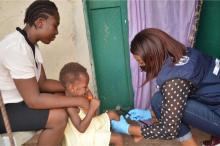Community informants’ network consolidating AFP surveillance to sustain polio eradication gains in Nigeria
Abuja, 12 July 2021 - As a health worker and a patent medicine vendor living in Gubio 1 ward, Borno State, Dauda Ahmed encourages members of his community to notify him or the nearest health facility of any child under 15 years with weakness or paralysis of any of the limbs.
Mr Ahmed is one of the pioneer Auto-Visual AFP Detection and Reporting (AVADAR) community informant in the state. He has been drawing from experience garnered during the polio campaign activities to report Acute Flaccid Paralysis (AFP) cases, using the Auto-Visual AFP Detection and Reporting (AVADAR), a mobile application that sends automatic case alerts to the appropriate disease surveillance officers in the Local Government Area and State who investigate it.
"I have been a pioneer AVADAR informant since November 2016. I was trained in Maiduguri, Borno State. As a reputable health worker with Gubio 1 MCH, the members of my community respect me due to the quality care and empathy I show to them wherever they bring their children to the hospital for treatment, immunization or when the mothers come in for child birth. This made it easier for them to listen to me and also notify me when they suspect a case of weakness of the limb in any child," says Dauda.
In August 2020, the global health community celebrated the eradication of wild poliovirus from the African Region. Polio is a highly infectious viral disease that can cause paralysis and death. The disease primarily spreads through eating and or drinking contaminated foods or drinks. There is no cure yet for the disease, and its disabling impact is often irreversible. Gladly though, the disease is vaccine preventable. Despite the country being wild poliovirus free, Nigeria’s polio programme faces challenges that include widespread outbreak of vaccine derived polio virus type 2 (cVDPV2) due to poor population immunity and surveillance gaps. In 2021, as at the end of June, outbreak of cVDPV2 had been reported in 11 states – Abia, Bayelsa, Borno, Jigawa, Kano, Kebbi, Nasarawa, Rivers, Sokoto, Yobe and Zamfara.
Keeping polio at bay
To keep cVDPV2 at bay, WHO has continued to work with all stakeholders including the government across all levels, donor agencies, frontline health workers, and the community to deliver immunization services and surveillance across the nation, especially in security compromised communities of Borno state.
The WHO Borno State Coordinator (ai) Ayodeji Isiaka, noted that WHO has been supporting the state to strengthen surveillance by building the capacity of the surveillance actors including the AVADAR community informants and also providing them with phones with airtime and supportive supervision.
“Once a case of suspected AFP alert is received, an investigation is conducted to confirm it. If found to be ‘true AFP’, stool sample is collected from such child and transported to the lab with the supported of WHO. The World Health Organization provides data analysis on the AVADAR/Community Informant performance and provide feedback to relevant stakeholders to inform decisions for improvement.
As at week 25 of the year 2021, a total of 163 AFP cases were reported from Borno State with 56 (34%) coming from 34 and 18 security compromised settlements and LGAs respectively. Furthermore, 23 (14%) of the 163 AFP cases were reported through the AVADAR system across the state.
Systematic engagement
The Borno State Incident Manager (IM) and Acting Executive Director, State Primary Health Care Development Board, Dr. Aliyu Shettima said the systematic engagement of Community informants from insecure areas (CIIAs) to vaccinate eligible children residing in those communities and conduct active surveillance has led to remarkable improvement in Polio eradication in the state.
"As of August 31st 2020, a total of 1,715 CIIAs have been engaged and implemented active surveillance and vaccination across 5,691 security compromised locations in the state with valid geo-evidence. Currently, the government is planning to return IDPs to their home town and re-open health facilities in those newly resettled areas, he added.
Appreciating WHO and donor partners for the roles played in the interventions, the IM urged WHO to continue supporting Nigeria as the government looks for alternatives to sustain the historic gain after the Polio certification.
He re-echoed that WHO has played a better role in managing polio surveillance and pleaded that the organization should consider extending the implementation of the Polio Transition Plan to enable the government to prepare more and include all the necessary resources required into the annual budget.
Support for polio eradication to the Government of Nigeria through WHO, is made possible by funding from the Bill & Melinda Gates Foundation, Department for International Development, European Union, Gavi, the Vaccine Alliance, Global Affairs Canada, Government of Germany, through KfW Bank, Japan International Cooperation Agency, Korea Foundation for International Healthcare, Rotary International, United States Agency for International Development, United States Centre for Disease Control and Prevention and World Bank.
Technical Contacts:
Dr Abdullahi Hamisu; Email: abdullahih [at] who.int; Tel: +2348077590066
Ms Kulchumi Hammanyaro; Email: hammanyerok [at] who.int; Tel: +2348077590066

